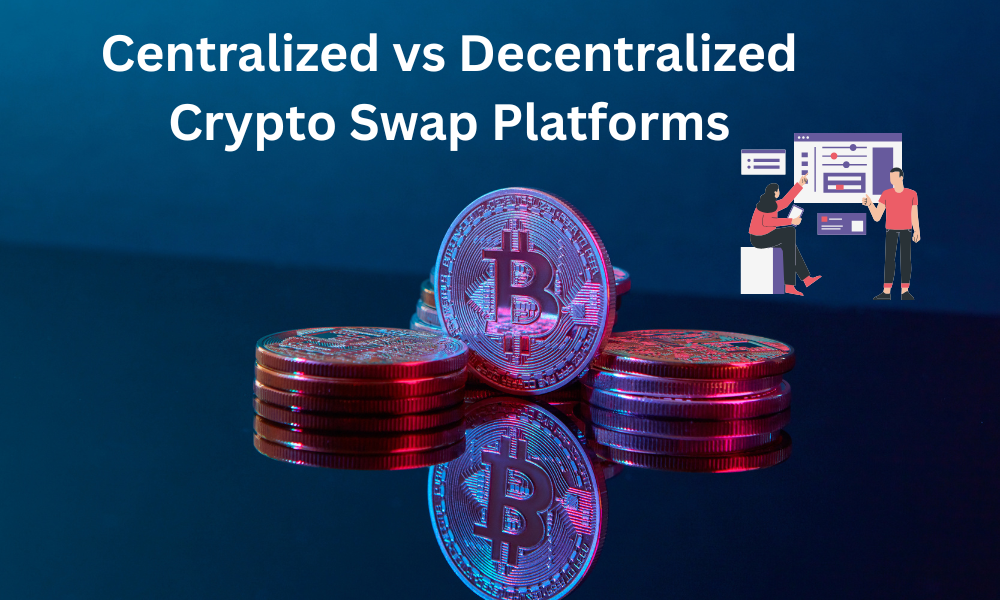Notifications

6 minutes, 44 seconds
-69 Views 0 Comments 0 Likes 0 Reviews

In the fast-changing world of cryptocurrency, choosing the right crypto swap platform has never been more critical. Whether you're new to crypto or a seasoned trader, knowing the difference between centralized and decentralized platforms can help you protect your assets, reduce fees, and maximize liquidity. This guide simply breaks down everything you need to know, helping you find the best crypto swap platform for your needs in 2025.
Centralized crypto swap platforms (CEXs) are run by companies that act as intermediaries between buyers and sellers. Popular examples include Binance, Coinbase, and Kraken. These platforms manage users' wallets, hold tokens on their behalf, and offer advanced trading tools.
Easy-to-use interface
High liquidity for fast trades
Access to a wide range of coins, including Bitcoin (BTC), Ethereum (ETH), and other altcoins
Customer support and security measures
Decentralized crypto swap platforms (DEXs) allow users to swap crypto no fees or with minimal charges through smart contracts, without giving up control of their wallets. Platforms like Uniswap, SushiSwap, and PancakeSwap are popular decentralized exchanges (DEXs).
Users trade directly from their cryptocurrency wallet (e.g., MetaMask or hardware wallets).
Powered by blockchain technology and automated market maker (AMM) models.
Privacy-focused with no need for identity verification (KYC).
|
Feature |
Centralized (CEX) |
Decentralized (DEX) |
|
Custody |
The platform holds your crypto |
You hold your crypto |
|
Privacy |
Requires KYC |
No KYC needed |
|
Trading Speed |
Fast with deep liquidity |
Depends on network congestion |
|
Security |
Centralized risks (hacks) |
Smart contract vulnerabilities |
|
Token Access |
Broad range, but limited |
Often quicker to list new tokens |
Simple interface for beginners
Better liquidity and market depth
Fiat on-ramps for credit card or bank transfers
You don't control your wallet
Prone to security breaches
Higher fees in some cases
Full control of your crypto wallet
Access to emerging altcoins and yield farming
Lower or no trading fees
It can be confusing for new traders
Risk of losing funds due to bad smart contracts
CEXs often have insurance and security teams, but they’ve been targets for major hacks (e.g., Mt. Gox, FTX). DEXs offer self-custody, but you must understand how blockchain and smart contracts work.
Use hardware wallets to secure your assets when using DEXs.
CEXs typically charge fees for deposits, withdrawals, and trading. DEXs like Uniswap may let you swap crypto with no fees, aside from blockchain gas costs (e.g., ETH network fees).
To minimize costs, compare:
Gas fees on Ethereum vs. BSC
Platform fee structures
Hidden costs on crypto exchange apps
CEXs win in ease of use. Their interfaces are smooth, and many offer crypto swap apps with tutorials. DEXs require connecting your wallet, understanding blockchain networks, and handling slippage.
If you're just starting, the best crypto swap platform might be a beginner-friendly CEX like Binance, Plus Wallet, or others.
Use CEX when you want speed, fiat deposits, or bitcoin trading.
Use DEX when trading niche tokens, seeking privacy, or doing yield farming.
Many traders use both depending on the situation. For example, swap BTC on Binance, then use a DEX for rare altcoins.
CEXs are required to comply with laws and may freeze accounts under certain conditions. DEXs operate globally without borders, which means there's little recourse if something goes wrong.
As decentralized finance (DeFi) grows, governments are also starting to look into regulating DEXs.
Yes. The future lies in hybrid models combining CEX liquidity and DEX autonomy. Platforms like dYdX and Thorchain lead this evolution, offering the best place to swap crypto across networks.
It depends on your goals. If you want simplicity and security, go with a CEX. If you want control and low fees, explore DEXs. Either way, always keep your wallet safe, understand what you're trading, and never invest more than you can afford to lose.
Binance or Coinbase offer user-friendly features and a secure environment.
Some DEXs offer low or no fees, but you'll still pay blockchain gas costs.
A crypto wallet like MetaMask, some ETH or BTC for gas, and knowledge of the interface.
They are safe if you use trusted platforms and securely protect your wallet.

